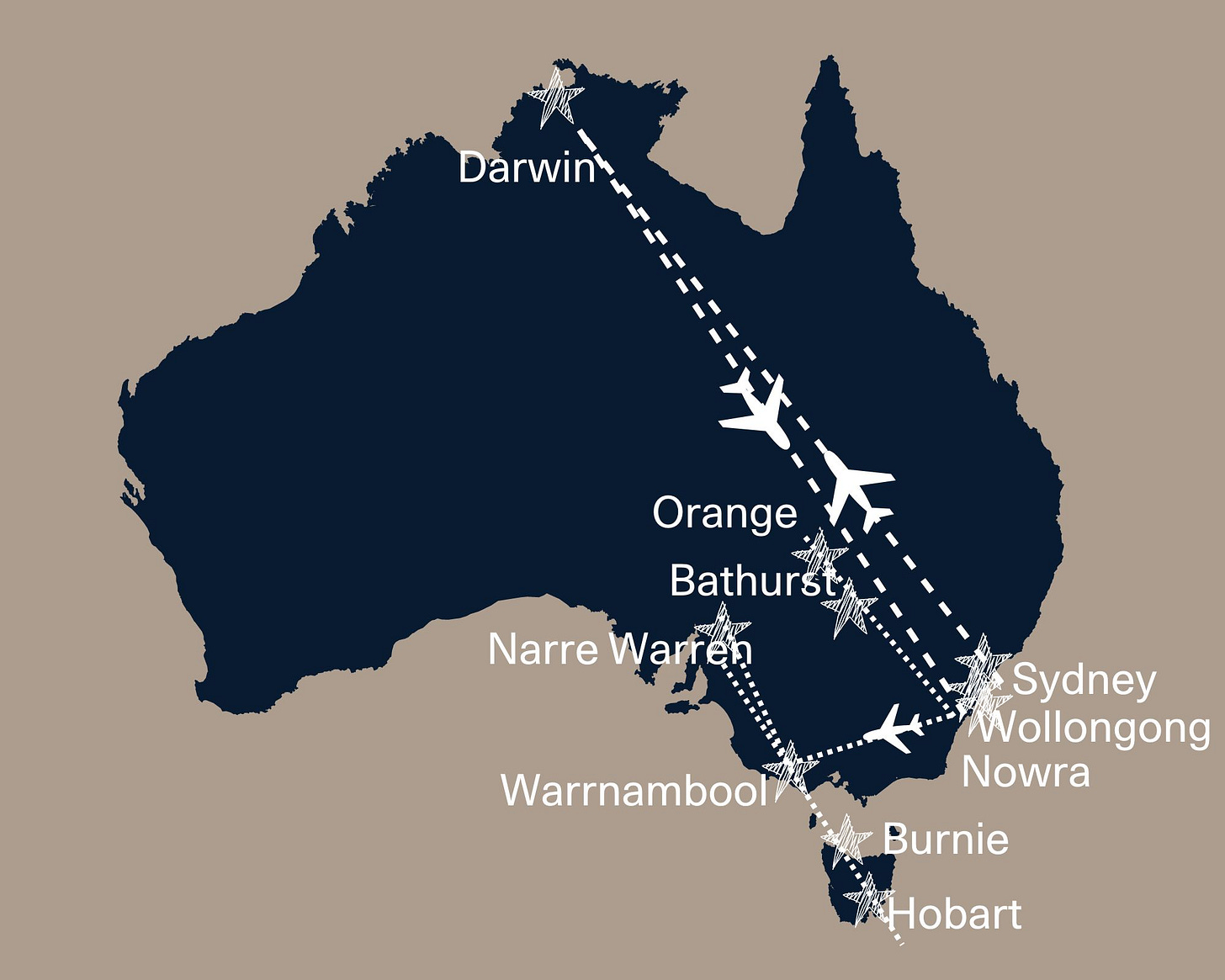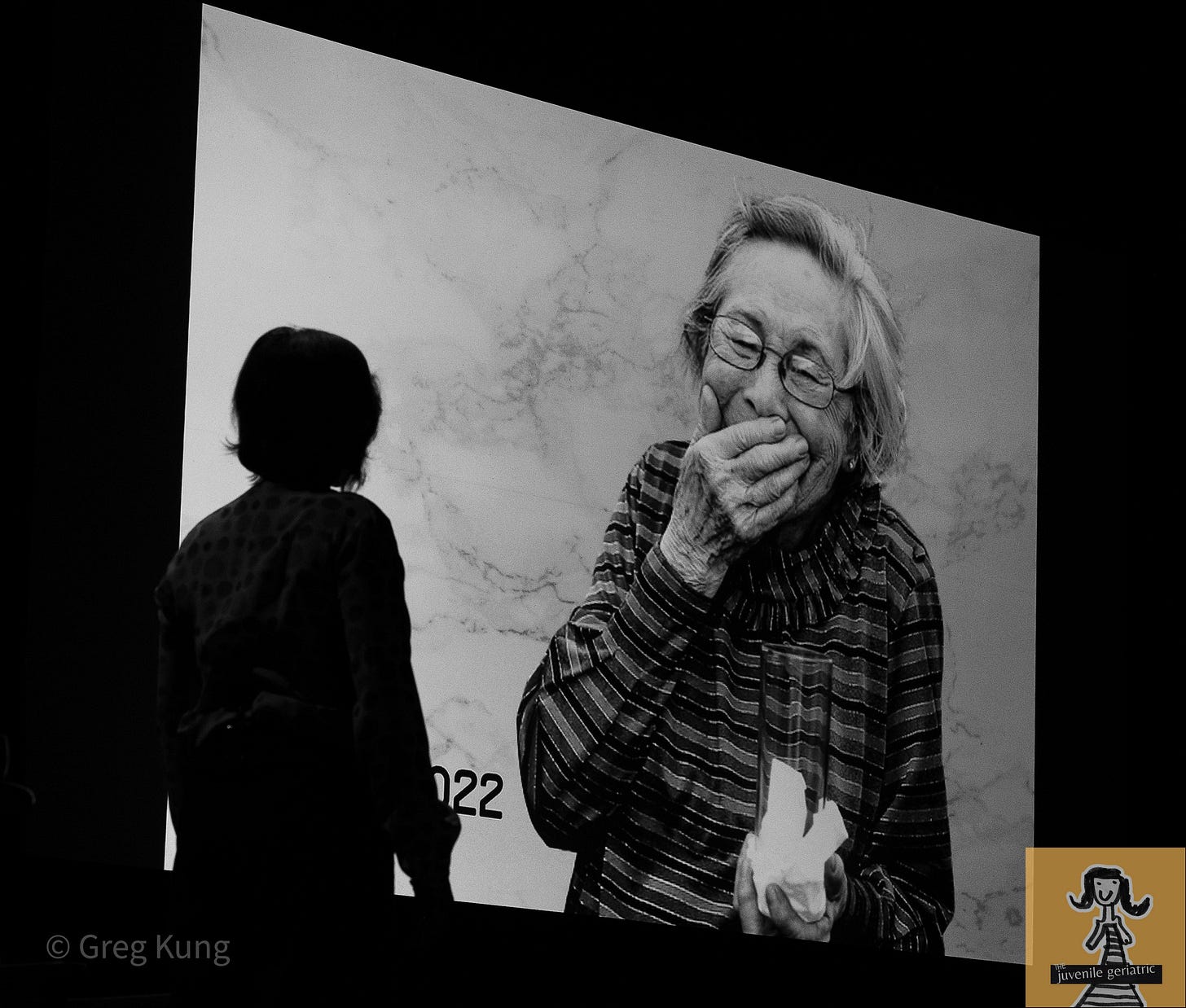Lessons from the road
A newsletter from Hobart, last leg of the Lost in Shanghai Tour
Welcome friends and new subscribers! It is opening night in Hobart, Tasmania, final stop of a month-long tour of Lost in Shanghai. It’s been a fabulous four weeks bringing my Mum’s story to ten theatres around this amazing country. For me personally it’s been a transformative experience as a performer, writer, and family history buff.
During the tour I’ve had the pleasure of meeting so many new faces at family story workshops, meet-and-greets and post-show Q&A’s. One lovely woman bought Terumi and me an after-show glass of bubbles, told us how much she enjoyed the performance and then exited the theatre, not wanting to impose on our time. Other people have shed tears with me, shared their stories, spoken about losing their mothers, expressed grief about parents suffering with dementia, prejudice from being mixed-race, being rejected or losing much-loved childhood homes. I was trying to explain these web-like connections to a radio interviewer this morning. Lost in Shanghai really is about human connection from generation to generation.
I thought for what is probably my final newsletter from the tour (don’t worry, I’ll be back here next week), I’d offer some observations and reminiscences about the journey I’ve been on. It’s a pretty random list. Here goes.
The Tour Book
Everyone in the touring company gets a copy of the Tour Book which details our flights, car hire details, timings and accommodation, tips, a few restaurants and treats (massage places, bars sometimes) and coffee recommendations. My favourite part of the tour book is the emergency recipe. So if you only have a kettle in your accommodation and you remember to bring vermicelli noodles and peanut sauce with you, you have a meal.
I loved this idea. Arts On Tour, our lovely touring company, revealed that as far as they know, no-one yet has tried making the recipe. I didn’t end up making Spicy Peanut Noodles either. But seeing the recipe in the book told me that the AOT team really cared about the one person who arrives at their destination and desperately needs something warm to eat, so they can get into an unfamiliar bed and hopefully, rest well. When you are moving every few nights, comfort and rituals take on new meaning.
While on the subject of food, I developed a new morning habit on tour. I didn’t want to eat a full breakfast every morning when I was likely to be eating lunch and dinner out as well. So I came up with this habit after a wellbeing workshop the team attended where we were encouraged to adopt practices that brought comfort and health as we travelled.
Here’s my healthy morning combo: I bring prebiotic powder and a jar of instant coffee vfrom home. Then when I arrive in a new place I purchase a bag of fresh carrots, berries, and milk. Breakfast is a full glass of pre-biotic water, a cold coffee shake, two carrots and half a punnet of berries. I often found it took a bit of time to crunch through two big carrots. On one occasion I walked into the Darwin Museum only to be told by the lovely Clair @clairparkinsonpottery (Instagram) “sorry, but you can’t bring your backpack inside. Or the carrot.”
Performance Report
Stage Manager Jen Jackson, sends out a production report after each performance to tell us what went well and what could have gone better. I looked forward to these reports for Jen’s observations and great sense of humour. Jen is the person who is changing the slides as I tell my Mum’s story. This is already a gargantuan job (especially as I tend to mix up my lines). Yet, in addition to this, she also oversees the tour, takes notes about the show itself, the lighting, sound, what is going on with the audience; moments when they laugh or murmur, clap or comment. One time (opening night) she referred to my ‘wardrobe malfunction’ when a decorative set of beads I was wearing began to break up and drop like tiny hailstones onto the stage, moments before I was due to get on stage.
The offer
In the world of theatre, whether during a rehearsal or a performance, I never got feedback or criticism. Nobody used those precise words. Whenever director Tasnim Hossain or stage manager Jen Jackson made a suggestion, it was presented as an ‘offer’ or a ‘note’ as in ‘I have a note for you’ or ‘here’s an offer’. I found this language shift deeply inspiring. In my former TV career, some managers couldn’t wait to tell me everything I did wrong or ideas that didn’t work or didn’t rate. It could feel callous and blaming. But a gift of advice? That’s an offer I can gratefully accept. I will certainly look for ways to fold that into my creative practice.
Audience
One of our first performances was for fifteen to seventeen year-old schoolchildren. I had delivered family story workshops to them a day earlier. Privately, I was terrified of performing in front of them. My inner imposter popped out and I could feel my nerves tying themselves into knots. I confided my fear to our , who worked at the venue we were in. As a performer herself, she understood my wobble.
“Just think of the one girl in the audience who needs to hear this story. Then tell it to her.”
I don’t think I can ever forget those words.
In another show we had a much smaller audience than I had hoped for. Initially, I felt disempowered. Then I stepped out on stage and saw that the audience had literally closed in, as if they were listening to someone telling stories around a camp-fire. They hardly uttered a sound until the funny bits. Then they revealed their delight with gentle laughter. It didn’t matter to this audience how many people were there. And it didn’t matter to me. I was bringing my story to them. As
said in a recent Substack post, ‘the numbers change nothing’ whether you have an audience of 10 or 100, we should show our work.Director Tasnim Hossain (quoting a friend) describes the ‘offer’ between performers and audience as ‘a church for the modern era’. "You are in the theatre, she says “where you might be in the dark. We put our phones away, we don't take calls, we don't get up and go attend to an urgent email. We're just there in that space for that ninety minutes or however long. And it feels like it's time that’s carved-out from the rest of our lives. That's really special.”
Every audience is different. “Sometimes they are very quiet,” notes stage manager Jen Jackson. “You feel like they are just paying attention and trying to listen to you, Jane, and engage with you in silence rather than responding more vocally. Or you can see someone leaning in, leaning forward in their seat because they are just so engrossed in the story. They are laughing or really alert. And every now and then, you see someone asleep in the front row! This does happen occasionally.”
Trusting the Process
I always imagined directors to be humans with megaphones wielding power. My experience with Tasnim Hossain couldn’t be further from that image. Once again, the word generosity, comes to mind.
Tasnim insisted I do vocal warmups on stage before each performance so I didn’t damage or strain my voice. She taught me the exercises and then she did the warm-ups with me. I’m happy to report that my voice has survived the tour!
I asked Tasnim to describe the role of a theatre director:
“I just trust the process. I trust that everyone is there because they're meant to be. And I trust that we've created an environment where people can express whether they're feeling stuck or uncertain; that we can work through it together. So definitely, there are moments where it feels like something might not have landed but I also know that that's not the end of the process. The joy of something like performance is that it shifts every night. Once you've published a book, unless there's a reprint, you can't fix things. But with theatre, you can because it lives and dies every single night.”
Once you've published a book, unless there's a reprint, you can't fix things. But with theatre, you can because it lives and dies every single night - Director, Tasnim Hossain
Friendship
I don’t usually hang-out with four people I don’t know well for a month. Our group chat is like a little journal, sharing everyday movements, what we did on our precious days off, Laksas (Malaysian and Indonesian soup noodle dish) consumed, restaurant suggestions, crocodiles, snakes, beautiful landscapes, little penguins, pademelons (stocky wallabies), morning swims in the Bass Strait and the chatter of being on a journey with a beginning and an end. Some of my work companions are young enough to be my kids. But I have so much respect for their professionalism and I’ve learned so much from them; how they navigate lives, choose paths, face adversity (as I say in the show). These really are conversations close to my being (another line from the show). I will cherish the Lost in Shanghai tour for many reasons. and I am so very grateful for the care and friendship of Jen, Sammy, Terumi and Kraig. Thank-you for looking out for me. And putting up with me. It’s been an honour and a joy working with you.
















Thank you for sharing your story and adventures, it’s been wonderful to read. I’m so disappointed I didn’t get to any of shows due to injury. I look forward to next project you do.
I enjoyed the show (in Nowra) very much thankyou. It was a pleasure to be able to say thankyou in person at the meet & greet. I hope the little card I made was well received. I am re-reading “ A Many Splendoured Thing” by Han Su Yin who explains the prejudice & disadvantage often experienced by Eurasian women back in the day.